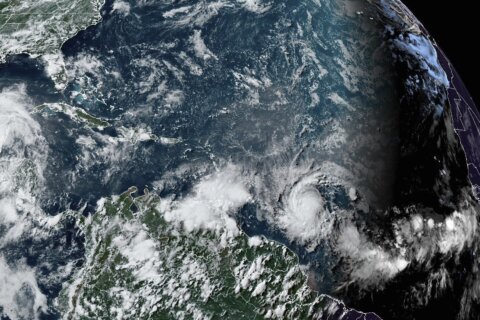A healthy diet is key to living a long and healthy life, but proper nutrition becomes even more important during pregnancy. After all, you’re growing a whole new human being inside of you.
During pregnancy, your body needs an immense amount of energy in order to support the physiological changes and demands your body must endure. In fact, pregnancy requires approximately 50,000 calories over nine months, according to a recent study.
However, rather than simply counting calories to meet your caloric needs, it’s important for pregnant women to focus on consuming healthy, nutrient-dense foods. This way, it’ll help ensure they’re getting enough of the specific vitamins and minerals needed to support their and the baby’s health.
[READ Pregnancy Checklist]
Importance of Proper Nutrition for Pregnancy
Prenatal nutrition plays a crucial role in the health and development of the baby.
“One of the most important things about prenatal nutrition is that it doesn’t really start when you become pregnant. It starts even before you’re pregnant,” says Dr. Sara Jacobs, a maternal fetal medicine specialist at Texas Children’s Hospital. “Their nutrition before pregnancy is just as — if not more — important as their nutrition during pregnancy.”
Ideally, women should be in a healthy body mass index range and following a healthy diet before they become pregnant to reduce the risk of pregnancy complications related to obesity, including:
— Miscarriage
— Venous thromboembolism (blood clots in the veins)
— Wound infections
— Induced labor
— C-section
— Fetal development issues
— Stillbirth
— Neonatal death
[READ: Checklist for Choosing a Maternity Hospital.]
Top 11 Nutrients for Pregnancy
A healthy baby starts with a healthy diet from their mother.
While they’re in the womb, babies draw nutrients directly from their mother. When you eat, your stomach digests the foods and breaks them down into nutrients that travel through your bloodstream to the placenta. The umbilical cord, which connects the placenta to the baby, delivers glucose, fats, vitamins, minerals and protein to help the baby grow.
“In pregnancy, the fetus is going to take what it needs from the mom,” Jacobs explains. “If mom is not getting adequate nutrition for herself, the baby is going to take what nutrition she has, which is going to result in nutrition deficiencies for her own health.”
The most important nutrients for pregnant women are:
— Folate and folic acid
— Iron
— Calcium
— Vitamin A
— Vitamin B6
— Vitamin B12
— Vitamin C
— Vitamin D
— Omega-3 fatty acids
— Iodine
— Choline
1. Folate and folic acid
— Daily recommended amount: 600 micrograms
— Health benefits: Prevents neural tube defects, which are birth defects of the brain and spinal cord
— Good food sources: Beans, dark leafy greens, eggs, fortified bread and cereal
Folate and folic acid are similar, but they’re not the same. Folate, also known as vitamin B9, is the natural vitamin found in food, while folic acid is the synthetic form of folate found in dietary supplements and fortified foods.
Both are critical before pregnancy and during the early stages of fetal development when the baby’s neural tube, which becomes the central nervous system, is still forming. This process occurs during the third and fourth weeks of pregnancy, but without sufficient folate or folic acid, there is an increased risk of neural tube defects, including spina bifida, anencephaly and encephalocele.
“This is where nutrition comes into play even before pregnancy,” Jacobs says. “It’s actually recommended that low-risk women take a prenatal vitamin that contains at least 400 micrograms of folic acid for a month before conception.”
However, for people with certain chronic health conditions, like diabetes, folic acid supplementation should start earlier — at three months before conception.
2. Iron
— Daily recommended amount: 27 milligrams
— Health benefits: Supports oxygen transport from red blood cells to the baby
— Good food sources: Lean proteins (including red meat, poultry and fish), beans, nuts, seeds, dark leafy greens, tofu
During pregnancy, your body’s blood volume increases by approximately 45%, pumping an additional 1,200 to 1,600 milliliters of blood to support the flow of oxygen to the baby. Because iron plays a critical role in the transportation of oxygen from you to the baby, it’s important to consume enough iron-rich foods. Otherwise, if your iron stores are low, you run the risk of developing iron deficiency anemia, which can lead to preterm birth, low birth weight and neurodevelopmental delays.
“Iron deficiency is really common, and we screen for it multiple times in pregnancy,” Jacobs says. “If iron deficiency is suspected, then we always recommend supplementing with an oral iron supplement.”
3. Calcium
— Daily recommended amount: 1,000 milligrams per day for those aged 19 and older
— Health benefits: Supports healthy fetal bone and teeth development
— Good food sources: Dairy products and fortified dairy alternatives (such as milk, yogurt, cheese), canned fish (such as sardines and mackerel), dark leafy greens
One of the side effects of pregnancy is bone density loss. Bone density — especially around the lumbar spine and hip bones — temporarily decreases as a normal part of pregnancy and breastfeeding due to hormonal changes and the high calcium demand required for fetal development. As a result, it’s important for moms to consume enough calcium-rich foods — such as milk, yogurt and nondairy alternatives — to support their own bone health, as well as their baby’s.
“The body is going to provide the baby with what the baby needs by taking calcium from mom’s bones,” says Jamie Mok, a registered dietitian who specializes in maternal and prenatal nutrition. “The body becomes more efficient at absorbing calcium while we’re pregnant, which is pretty magical.”
4. Vitamin A
— Daily recommended amount: 770 micrograms for ages 19 to 50
— Health benefits: Supports eyesight, immune development, healthy skin and bone growth
— Good food sources: Carrots, sweet potatoes, dark leafy greens
While vitamin A
supports the baby’s immune development, skin and bone growth, it is a vital nutrient for visual health. In fact, vitamin A deficiency, which is common in Africa and Southeast Asia, can lead to night blindness and other visual impairments.
5. Vitamin B6
— Daily recommended amount: 1.9 milligrams
— Health benefits: Promotes red blood cell formation and fetal absorption of macronutrients
— Good food sources: Chickpeas, fish, beef liver, potatoes, whole-grain cereals
While vitamin B6 helps the body form red blood cells and absorb macronutrients, another added benefit of increasing your intake of vitamin B6 — especially for women experiencing morning sickness — is that it may help reduce nausea and vomiting during pregnancy.
6. Vitamin B12
— Daily recommended amount: 2.6 micrograms
— Health benefits: Supports nervous system development and red blood cell formation
— Good food sources: Meat, salmon, tuna, nutritional yeast
The body needs vitamin B12 in order to develop and maintain proper functioning of the central nervous system, form red blood cells and synthesize DNA. A 2017 study conducted by researchers at Harvard T.H. Chan School of Public Health found that higher levels of vitamin B12 in pregnant women were associated with better cognitive development and higher expressive language skills in their children.
7. Vitamin C
— Daily recommended amount: 85 milligrams for ages 19 to 50
— Health benefits: Supports immune function, enhances iron absorption and promotes healthy bones, teeth and gums
— Good food sources: Citrus fruits, tomatoes, bell peppers, strawberries
Vitamin C is widely known to boost immune function, but it also helps the body absorb iron, which is critical in supplying oxygen to the baby. Additionally, low intake of vitamin C has been associated with pregnancy complications, including preeclampsia, anemia and small fetal weight, according to research.
8. Vitamin D
— Daily recommended amount: 600 international units
— Health benefits: Supports the development of baby’s bones and teeth
— Good food sources: Fortified milk, fatty fish (including salmon and sardines), mushrooms, egg yolks
Vitamin D and calcium go hand in hand. In order for your body to properly absorb calcium, it needs adequate levels of vitamin D. In fact, your body typically absorbs 30% to 40% of the calcium you consume when you complement your intake with vitamin D-rich foods. However, without enough of the vitamin, calcium absorption drops to only 10% to 15%, according to research.
9. Omega-3 fatty acids
— Daily recommended amount: 400 to 550 milligrams, including 225 milligrams of docosahexaenoic acid (DHA)
— Health benefits: Supports brain, nervous system and eye development
— Good food sources: Fish (including mackerel and salmon), walnuts, flaxseed, chia seeds
Omega-3 fatty acids are important for both mom and baby. Research shows that two specific types of omega-3s — docosahexaenoic acid (DHA) and eicosapentaenoic acid (EPA), which are found in fish and fish oil — lower the risk of preeclampsia, postpartum depression and preterm labor, while supporting the baby’s brain, nervous system and eye development.
10. Iodine
— Daily recommended amount: 220 micrograms
— Health benefits: Promotes healthy thyroid function and brain development
— Good food sources: Fish, seafood, seaweed (such as nori, kombu, kelp and algae), dairy products, eggs
Pregnant women need approximately 50% more iodine to support the health of themselves and the baby. Low iodine levels can lead to hypothyroidism, a condition characterized by low thyroid hormone levels. During pregnancy, this can increase the risk of preterm delivery, poor fetal growth and development and — in severe cases — hearing problems, stillbirth and infant death. However, it’s important not to overdo it either, as high iodine levels can also be harmful to both mom and baby.
11. Choline
— Daily recommended amount: 450 milligrams
— Health benefits: Vital for supporting baby’s brain and spinal cord development
— Good food sources: Soy, eggs, cruciferous vegetables, dairy products
While choline helps promote the overall health of a woman during pregnancy, this essential nutrient is critical for babies. Making sure you get enough choline during pregnancy can significantly reduce the risk of neural tube defects and support brain development and function.
Choline is often not included in the amount that’s recommended in most prenatal vitamins, which either contain little or no choline.
“While that additional choline can come from food sources, if a patient is not following a healthy diet, they may need to take an additional choline supplement as well,” Jacobs says.
Prenatal Vitamins
Taking prenatal vitamins and supplements is important for filling any nutritional gaps that are common among pregnant women — such as iron, choline, calcium and folic acid. Experts recommend that low-risk women take prenatal vitamins at least one month before pregnancy, throughout pregnancy and while breastfeeding.
Just remember: Prenatal vitamins are dietary supplements that should not be a replacement for healthy eating.
“Supplements supplement a healthy diet. They don’t replace it,” Mok says. “Our bodies prefer obtaining nutrients from food first because nutrients from food are more readily absorbed by our body.”
[SEE: What to Pack in Your Hospital Bag When You’re Expecting.]
Best Foods to Eat When Pregnant
So, what exactly are the best foods to eat while pregnant, according to experts?
Here are the most important foods you should eat during pregnancy to make sure you and your baby are healthy.
1. Fruits and vegetables
Consuming a variety of fruits and vegetables is critical of any healthy diet, but during pregnancy, this becomes even more important. Fruits (like berries, bananas, oranges and kiwis) and vegetables — especially dark leafy greens (such as spinach, kale, arugula and bok choy) — are rich sources of vitamins, minerals and antioxidants that nourish both mom and baby.
For example, kale is a nutritional powerhouse and superfood that is high in vitamins A, B6, C and K, as well as fiber to relieve pregnancy-related constipation and folate to support the baby’s brain and spinal cord development.
2. Whole grains
Whole grains — including quinoa, brown rice, farro and oatmeal — are rich in fiber to help keep pregnancy constipation at bay, but they’re also good sources of B vitamins, iron, copper, zinc, antioxidants and phytochemicals.
Quinoa, in particular, is high in folate, providing approximately 78 micrograms in 1 cup.
3. Eggs
While some people may avoid eating eggs out of fear that they are unhealthy, it’s important to remember that they actually pack a nutritional punch. Both egg whites and egg yolks contain an array of B vitamins, but vitamins A, D and E are only found in the egg yolks. Plus, egg yolks contain choline and omega-3 fatty acids.
4. Beans and legumes
Beans and legumes — such as chickpeas, white beans and soybeans — are excellent sources of iron, folate, protein and fiber, as well as many other vitamins and minerals.
To increase your choline intake, opt for kidney beans, navy beans or soybeans, including edamame and soy products (such as tofu) — all of which contain some of the highest levels of choline in this food group.
5. Dairy or dairy alternative products
Consuming low-fat or nonfat dairy products — such as milk, cheese and yogurt — can help pregnant women get their recommended intake of calcium. However, if you’re lactose intolerant or simply prefer nondairy options, many plant-based dairy alternatives are fortified with calcium and vitamin D.
6. Fish
Fish are excellent sources of omega-3s, iodine, choline, iron, vitamin B12 and vitamin D — all of which support the health and development of the baby. But pregnant women should be mindful of the types of fish they consume, specifically low-mercury fish, as too much mercury can harm the baby’s brain and nervous system.
A helpful mnemonic device for remembering the best low-mercury fish to eat is SMASH:
— Salmon
— Mackerel
— Anchovies
— Sardines
— Herring
For an extra boost of calcium, Mok recommends eating canned salmon, sardines and light tuna with skin and bones, which increases the calcium content of the fish.
7. Seaweed
Seaweed — such as kelp, kombu, nori, wakame and chlorella — contain vitamins A through E, calcium, potassium, magnesium and iron, but they’re also good sources of iodine, which is important for fetal development.
“Iodine is often found in a lot of seafood, fish or eggs, but if some folks either have an aversion to those foods or are following more of a plant-based diet, then seaweed or sea vegetables is a great place to find iodine,” Mok says.
What Is the Best Diet for Pregnancy?
While there is no singular diet that is best for pregnant women, experts agree that the best approach for pregnant women is one that emphasizes eating a variety of fruits, vegetables, whole grains, low-fat or nonfat dairy, fish and seafood, beans, nuts, seeds and healthy fats, while limiting the consumption of added sugars, saturated fat, sodium and processed foods.
If this eating pattern reminds you of the Mediterranean diet, there’s a good reason for that.
“The Mediterranean diet does check off a lot of boxes because it focuses on those nutrient-dense foods … that are loaded with vitamins, minerals, antioxidants, fiber and omega-3 fatty acids, which are all anti-inflammatory in nature, help promote a healthy gut microbiota and support a healthy immune system,” Mok says. “(That explains) why this type of eating pattern could mitigate some of the adverse pregnancy-related outcomes.”
In fact, a recent study published in Advances in Nutrition linked the Mediterranean diet during pregnancy to better perinatal outcomes, including a reduced risk of pregnancy-related hypertension, gestational diabetes, preterm delivery and low infant birth weight.
But that doesn’t necessarily mean the Mediterranean diet is the only option.
“The best diet for pregnancy really is one that meets all the recommended energy and nutrients needs for mom and babies’ healthy growth and development,” Mok says. “That can be in different forms aside from the Mediterranean diet, especially when we talk about how to fit that into our cultural preferences and practices.”
How Often Should You Eat When Pregnant?
Pregnancy often comes with various food cravings and aversions, as well as nausea and vomiting from morning sickness, that can cause your appetite to fluctuate. These challenges naturally make it difficult to maintain a strict, healthy eating regimen with a set number of meals.
As your appetite waxes and wanes throughout the different stages of pregnancy, it’s important to not put pressure on yourself by following a specific diet during pregnancy. Instead, experts encourage you to focus on eating several small meals and snacks every few hours, focusing on a variety of nutrient-dense foods from all food groups. That way, you can ensure you’re getting all the nutrients and energy you need to nourish yourself and your baby for optimal growth and development.
“A healthy diet can be achieved in different ways according to your preferences and what kind of challenges you’re having with food,” Mok says. “I always recommend my pregnant moms to always listen to their bodies and stay really flexible throughout the experience of navigating their diet and food choices.”
Bottom Line
As the saying goes, “an ounce of prevention is worth a pound of cure.” By practicing healthy eating habits before and during pregnancy, expecting moms can prevent an array of health issues for both them and their babies.
“Many patients, once they become pregnant, want to make a lot of healthy lifestyle choices to try to reduce their risk for their child, but it’s really even before pregnancy when that needs to be evaluated and adjustments need to be made,” Jacobs says.
For tailored guidance on healthy eating before, during and even after pregnancy, consult your health care provider and/or a registered dietitian.
More from U.S. News
Hospital Bag Checklist for Mom: What to Pack for Delivery
Fertility Diet: What to Eat If You Want to Get Pregnant Faster
Best Nutrients and Foods to Eat When Pregnant originally appeared on usnews.com







